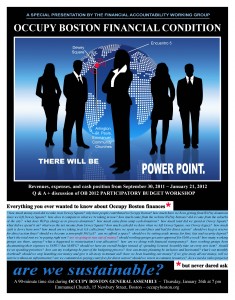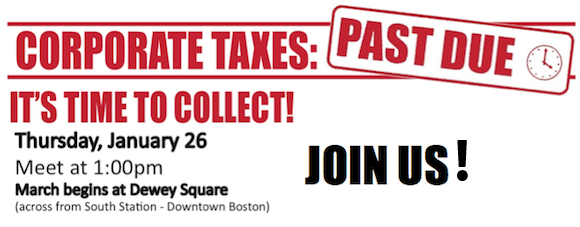Less ride for your money on the T? – MBTA proposes unpopular weekend service cuts and fare hikes
On Jan. 3, the Massachusetts Bay Transportation Authority, which operates Boston’s public train and bus systems, proposed two fare increase and service reduction plans that could raise the price of a single T trip to as much as $2.40 with a CharlieCard (up from the regular $1.70).
. . .
MBTA patrons were less forgiving than the state of Massachusetts. On Monday, the T Riders Union, Occupy Boston members, and local student activists rallied in front of the State House, holding signs saying “We need affordibiliT” and “MBTA: My Bus Taken Away.” During the public meeting that followed, a popular idea among attendees was to look to the state government for funding, as an alternative to service cuts.
http://tinyurl.com/87zbod3
The trouble with sellouts – Formerly ‘courageous’ law enforcement dissident will co-chair mortgage fraud committee comprised of fraud enablers
[Obama announced the creation of yet another federal investigative committee in his SOTU address that will further the cause of running out the clock on the statutes of limitation on mortgage and finance industry crimes, or the political will to do something about them. It will be co-chaired by New York Attorney General Eric Schneiderman.]
Remember, as we discussed when the Roosevelt Institute accepted money from the Peterson Foundation and then repudiated FDR’s legacy by publishing policy papers on how to “reform” entitlements, the real prize for the neoliberals is to get trusted progressive organizations to do their dirty work.
It’s clear what the Administration is getting from getting Schneiderman aligned with them. It is much less clear why Schneiderman is signing up. He can investigate and prosecute NOW. He has subpoena powers, staff, and the Martin Act. He doesn’t need to join a Federal committee to get permission to do his job. And this is true for ALL the others agencies represented on this committee. They have investigative and enforcement powers they have chosen not to use. So we are supposed to believe that a group, ex Schneiderman, that has been remarkably complacent, will suddenly get religion on the mortgage front because they are all in a room and Schneiderman is a co-chair?
http://tinyurl.com/7a5pxmf
Global wave of activism comes in part because civil society groups and NGOs have failed to resist, to effect change
Many of today’s large mainstream NGOs started out as scrappy, confrontational groups of activists. Greenpeace, to take just one example, rose out of antinuclear protests in 1971. Today the group maintains offices in 40 countries. “If you look at any protest movement in the last 50 years, they have started off as challengers,” said Brayden King, an assistant professor of management and organizations at Northwestern University’s Kellogg School of Management. “But with success they have all become more institutionalized,” he added. “Now they are no longer really a movement anymore, but professional advocacy groups.”
That institutionalization entails compromise and inevitably requires professional staff, many of whom come from the private sector. King says that students in his MBA classes often say their goal is to make a lot of money and then pursue their passion by working for an NGO. “While that is great and noble, they don’t have the same background in activism and have little in common with the activists they end up working with,” King said. A perfect illustration of his point can be seen at Davos, where leading executives of mainstream NGOs have become fixtures. Last year, for instance, executives from Mercy Corps, Greenpeace, and World Vision International – a Christian humanitarian organization – were all in attendance.
. . .
The most recent data available from the Internal Revenue Service show that the top 1 percent of U.S. taxpayers earned a minimum of $343,927. Data provided by Guidestar, which collects information on nonprofit organizations, shows that the median compensation for the CEO or executive director of nonprofits – which includes museums, some universities, and hospitals – with budgets of more than $50 million rose 60 percent to $422,000 between 2000 and 2009.
http://tinyurl.com/7qcrpor
Continue reading “The OB Media Rundown for 1/26/12” »





